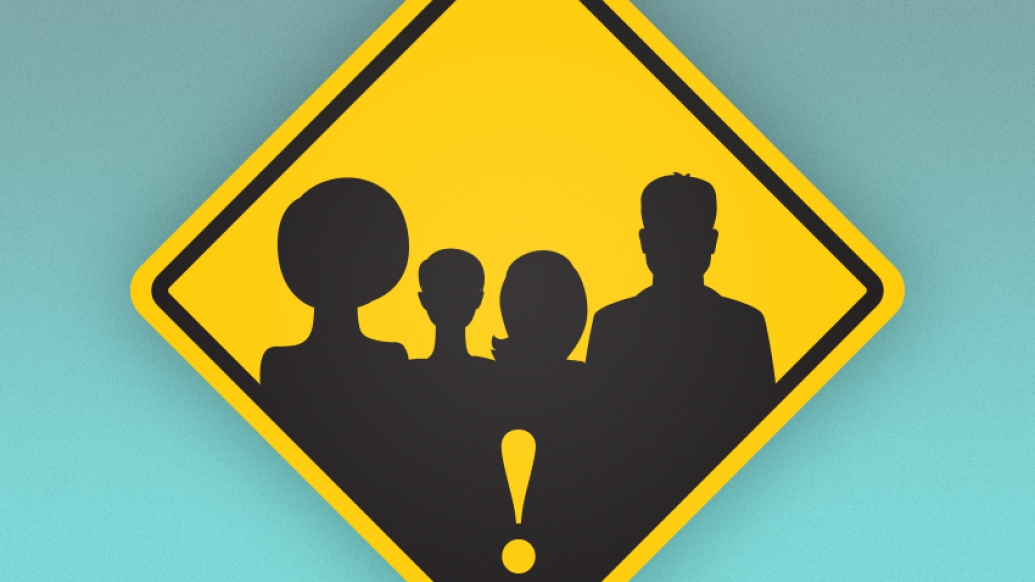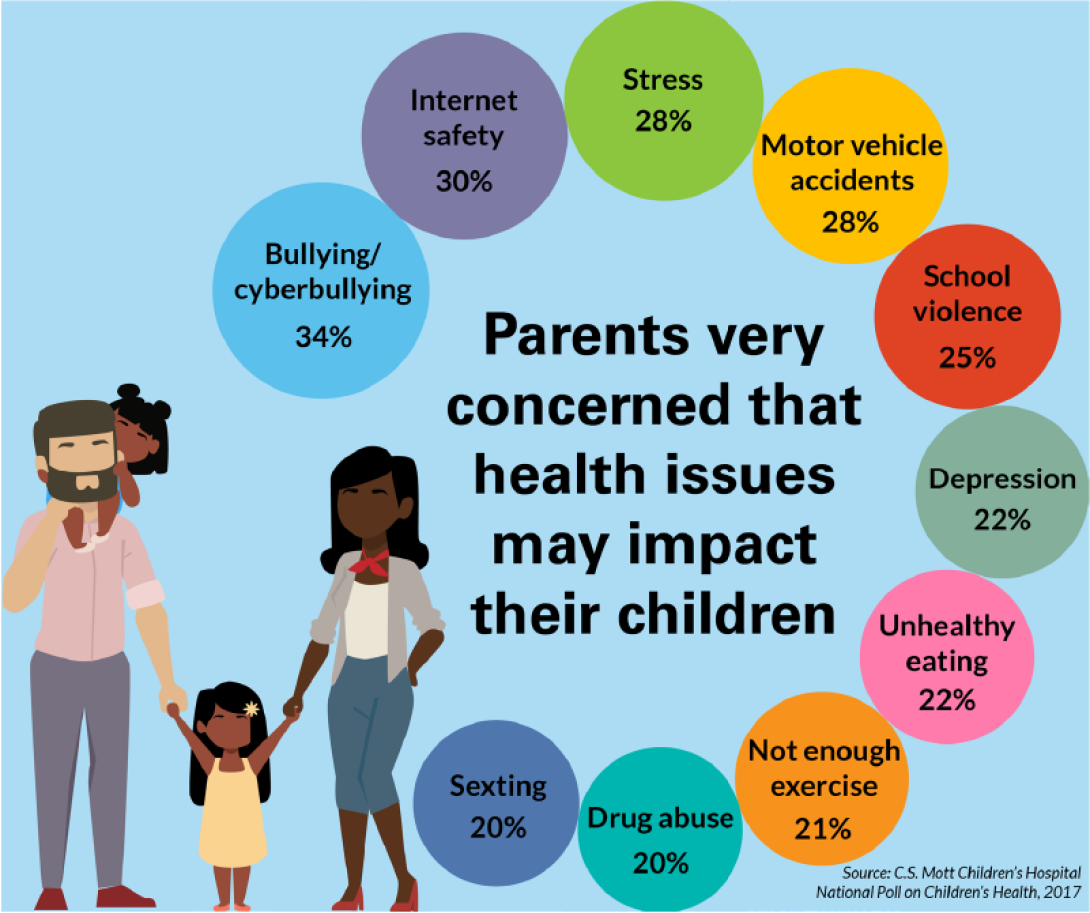With the release of an annual poll on common kids’ health worries, a pediatrician addresses the parental concerns — and outlines action plans to help.
7:00 AM
Author |

Parents have plenty to worry about when it comes to their kids' well-being.
And their concerns may vary from what the general population considers a risk to young people, according to a new report from the C.S. Mott Children's Hospital National Poll on Children's Health at the University of Michigan.
MORE FROM MICHIGAN: Sign up for our weekly newsletter
For the first time in the poll's history, findings were presented two ways: children's health-related concerns of all 2,051 adult survey participants — and a separate rundown that only includes parents of children age 0-18.
"There were definitely some things that were different among the two groups," says Gary Freed, M.D., M.P.H., a Mott professor of pediatrics and the poll's co-director.
The fear of motor vehicle accidents and school violence ranked fourth and fifth among parents; neither made the top 10 in the overall list. Likewise, child abuse and teen pregnancy were key worries overall, but neither topic ranked in the parents-only subgroup.

Still, many issues were universal: The threat of bullying or cyberbullying was a top concern among all parties.
The list, Freed says, should prompt families to have frank conversations early and often.
After all, "One can't spontaneously invent a relationship based on trust; it needs to be worked on so a child can survive changes in development and life," he says.
Freed spoke about parents' top concerns and tips to address them.
Top 10 concerns of parents
1. Bullying/cyberbullying
Whether harassment takes place in person or online, the actions can have deep effects on a child's mental and physical health. Conflicts may occur out of sight — or on a handheld screen — so families need to watch for warning signs. Those might include a reluctance to talk about school, fear of riding the bus or difficulty in other peer relationships. Open dialogue, Freed says, should follow: "Parents need to talk to their kids daily about what is going on in their lives."
2. Internet safety
Children can put themselves at risk by talking to strangers via social media, chat rooms or message boards — places where anonymity and deception are simple. Says Freed: "People pretending they're teenagers or preteens may, in fact, be older individuals seeking to prey on young children." That's why it's important to regularly monitor a child's internet use and stress the value of security (never giving out a phone number, email or home address or a credit card number).
SEE ALSO: What Parents Should Know About Safe Swaddling
3. Stress
Yes, kids can get stressed. But the stressors need not be life-threatening. "It might be regarding schoolwork, peer relationships or athletic or arts performance," Freed says. Others, though, could be serious: a divorce, sick relative or financial problems. In any case, conversation is key. "Parents need to find out what is causing a child stress and to try and put their concerns into perspective," Freed adds. A school or professional counselor can offer guidance if needed.
4. Motor vehicle accidents
There's more to worry about than keeping one's hands at 10 and 2. Mobile devices and high-tech dashboards can easily steal a driver's attention (which could explain why teens were the largest group reported as distracted at the time of fatal crashes). Parents must stress the importance of distraction-free driving — and model good behaviors themselves. They also must emphasize never to ride with a driver who is under the influence of drugs or alcohol.
5. School violence
Once considered unthinkable, the notion of being injured at school by a classmate or an outside attacker is a fear that's all too real. Although schools prepare with drills and staff training, Freed says families can also help alleviate a child's fears by establishing a communication plan that could be applied in any crisis. "Know who a student should call if they become aware of a dangerous situation," Freed says. "It's always good to have a strategy."
6. Depression
Increased stress levels can lead to depression, Freed says. But signs of the mental health condition might not come verbally. Instead, an affected child could become withdrawn, show little interest in friendships or hobbies and decline in academics. Depression, though treatable, is also a risk factor for suicide, which is why seeking assistance needn't come with stigma. "It's important to consult your pediatrician to see what kind of help can be provided," Freed says.
7. Unhealthy eating
Sure, kids can be picky eaters or prefer sugary or fatty snacks. But doctors note that bad habits typically begin at home (like a refrigerator and pantry stocked with junk food). Adults, Freed says, hold the key to curbing childhood obesity: "Parents need to be strong in determining what types of food they buy and also in setting an example for their children by making healthy choices." Another Mott pediatrician recently shared her tips for improving nutrition at home.
SEE ALSO: 10 Safety Tips for Fall Yardwork
8. Not enough exercise
Just like diet, parents can help their children shake off sedentary routines that contribute to obesity by making physical fitness a family affair. That might mean gearing up for a shared bike ride, playing Frisbee in the backyard or capturing Pokémon around the neighborhood. Simple leisure outings can help young people get the recommended 60 minutes of daily exercise (and provide a reasonable excuse to get off the couch). Sports leagues are effective, too.
9. Drug abuse
The range of drugs available to kids entails far more than illegal substances obtained from a dealer. The home medicine cabinet is one of the most common sources of abused medications. That's where many young adults who report such abuse first obtained the drugs. And it's why parents and children should speak frankly about the associated dangers. "Your family doctor can provide a portal of entry for a variety of different treatments if a problem is suspected," Freed says.
10. Sexting
It only takes a second to send a sexually explicit photo. But the spontaneous act — especially if sent to a third party — can violate a child's privacy and, depending on the situation, incite long-term emotional damage (not to mention legal complications, which vary among states). Says Freed: "A sender has no idea where those pictures are going to end up and no idea how widely transmitted they may be." Although a sensitive topic, sexting warrants family discussion.

Explore a variety of health care news & stories by visiting the Health Lab home page for more articles.

Department of Communication at Michigan Medicine
Want top health & research news weekly? Sign up for Health Lab’s newsletters today!





